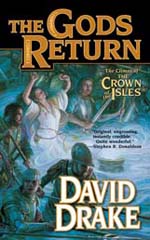The religion of the Isles is based on the Sumerian triad of Inanna, Dumuzi, and Ereshkigal. The fact is of more significance here than it has been in the previous books of the series.
The magic (which in the Isles series is separate from religion) is based on that of the Mediterranean Basin in classical times. Its core was probably Egyptian, but it borrowed heavily from other cultures (including Jewish elements). What I call words of power are the voces mysticae which were written or spoken to bring the request to the attention of demiurges.
I do not believe the magic of the Isles series or any other magic is effective in the waking world. I’ve been wrong about many other things, however. On general principles, I prefer not to pronounce the words of power when I transcribe them.
My background is basically that of a classical antiquary. There’s a great deal to amuse other classicists in this novel besides the snatch of Ovid which I translated (for more, see the Ovid section of the website). I put in these references not as jokes but to give some of the texture of our wonderful real world to my fantasy creation. (Though, okay, the discussion of Pytheas and Strabo is a bit of a joke.)
I don’t believe I’ve discussed style in print before. I’m going to do so here because of some recent questions.
Although this novel (and most of mine) is told in third person, I do not use an omniscient narrator: each section is written from a particular viewpoint and in language appropriate to that viewpoint. Ilna is more formal than her brother Cashel, but neither of them has the educated vocabulary to be expected from Garric or Sharina. In all cases this internal viewpoint involves the use of contractions that would not be proper in (say) an academic paper.
I believe this helps to put the reader in the character’s own worldview. You may think I’m a fool to do this or that the technique doesn’t work; we can discuss those matters. Please, though, don’t assume that I and my erudite editors are ignorant of the rules of formal English prose.
One final note: we scattered the ashes of my editor and publisher Jim Baen in a grove on my property. I’ve put the grove into this novel. I can’t say with Horace, “Exegi monumentum aere perennius . . . ,” but I felt that a little extra memorial to my close friend would be a good thing.
–Dave Drake
